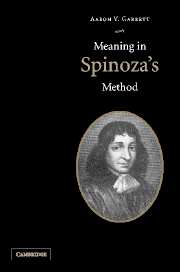Book contents
- Frontmatter
- Contents
- Acknowledgments
- List of abbreviations
- Texts and editions
- Introduction
- 1 A worm in the blood: some central themes in Spinoza's Ethics
- 2 A few further basic concepts
- 3 Emendative therapy and the Tractatus de Intellectus Emendatione
- 4 Method: analysis and synthesis
- 5 Maimonides and Gersonides
- 6 Definitions in Spinoza's Ethics: where they come from and what they are for
- 7 The third kind of knowledge and “our” eternity
- Bibliography
- Index of passages referred to and cited
- General index
Introduction
Published online by Cambridge University Press: 22 September 2009
- Frontmatter
- Contents
- Acknowledgments
- List of abbreviations
- Texts and editions
- Introduction
- 1 A worm in the blood: some central themes in Spinoza's Ethics
- 2 A few further basic concepts
- 3 Emendative therapy and the Tractatus de Intellectus Emendatione
- 4 Method: analysis and synthesis
- 5 Maimonides and Gersonides
- 6 Definitions in Spinoza's Ethics: where they come from and what they are for
- 7 The third kind of knowledge and “our” eternity
- Bibliography
- Index of passages referred to and cited
- General index
Summary
This is a book about Spinoza, one of the greatest philosophers of the seventeenth century, or of any time. He is also a particularly controversial philosopher and particularly difficult to understand. The controversies primarily stem from the fact that Spinoza's two best-known works, the Ethics and the Tractatus Theologico-Politicus, contain forceful criticisms of some of the central pillars of revealed religion. As an alternative to revealed religion, Spinoza offered a rigorous and powerful philosophy – most notably a metaphysics that demonstrated the necessity in and eternity of nature and equated nature with God – that, he argued, underlay whatever truths could be found in religion and philosophical theology.
Consequently, Spinoza was viewed by many of his contemporaries as a dangerous and nearly Satanic figure. Dutch Calvinists, liberal Hobbesians, and many key Enlightened figures of the scientific revolution all united in vigorously attacking the TTP and the Ethics. Furthermore, these attacks did not subside with Spinoza's death in 1677, but rather continued for centuries.
Spinoza's philosophy was also admired by many free-thinkers and philosophes. In the eighteenth century and early nineteenth century Spinoza even became the secular saint of a kind of mystical pantheist deism for authors like Goethe, Schelling, and Coleridge. In the twentieth century Spinoza has been credited with, among many other things, a founding role in modern empirical psychology, psychoanalysis, Marxism, Nietzscheanism, liberalism, the modern Jewish secular identity, and too many other -isms and -ologies to mention.
- Type
- Chapter
- Information
- Meaning in Spinoza's Method , pp. 1 - 19Publisher: Cambridge University PressPrint publication year: 2003



